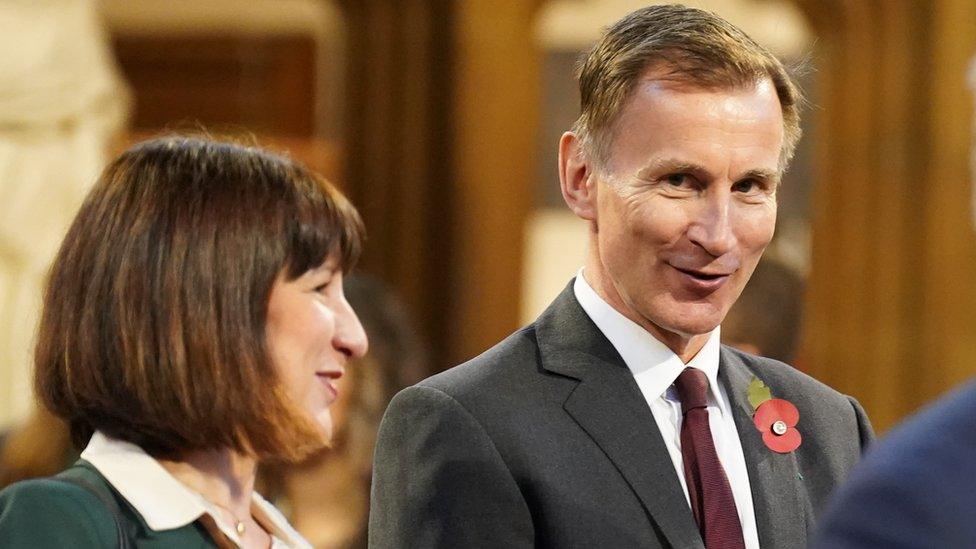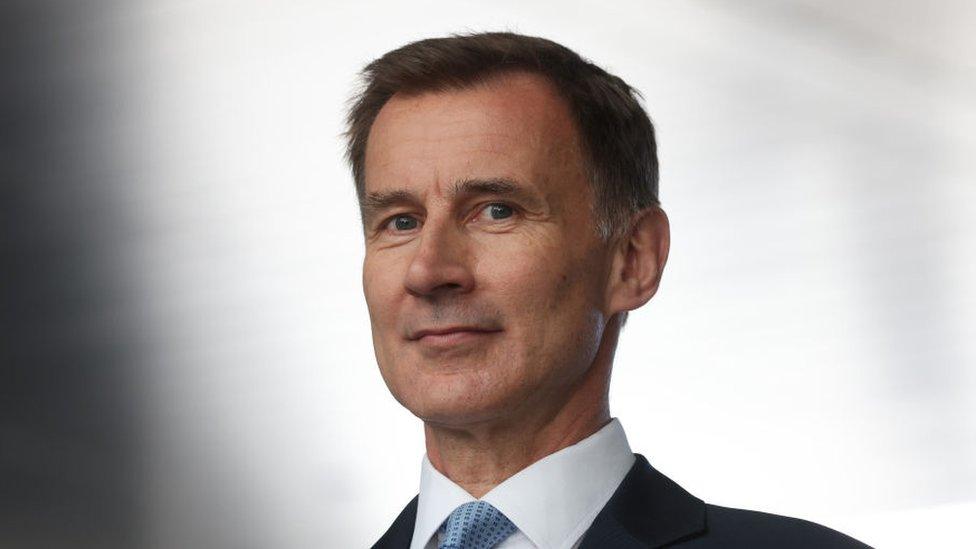Looming election takes centre stage in Budget week
- Published

The choreography and theatre that surrounds a Budget invariably involve public performance before the curtain formally rises and the chancellor takes to his feet in the Commons.
The acts in advance, whether briefed out intentionally or leaked - or a combination of the two - turn a single-day event into a sprawling thing over a week or more.
Plans, or even just options, can be floated, commanding more attention than they would individually get, amid the cacophony of the big day itself.
Reaction to them can be tested. Opponents can be teased or wrongfooted, or so a chancellor might hope.
And more on that in a minute.
But first, the big picture. You can explore it in detail here, external, courtesy of the Institute of Fiscal Studies (IFS), a think tank.
The economy is stagnant. The UK is in recession, albeit a mild one.
GDP per person, a measure of economic output per person, is down over the last few years.
Oh, and as the IFS puts it, "the current Parliament remains the biggest tax-raising Parliament in modern history".
This is primarily down to the freezing of the thresholds at which people pay a particular tax rate.
Pay rises - even pay rises that don't really feel like pay rises because of high inflation - tip more people into higher tax brackets, and so they pay more tax, all without the chancellor ever having to announce anything.
The colossal costs of the pandemic, and the economic consequences of the war in Ukraine, mean the government is spending a record amount on interest payments on the UK's debt.
And that means ministers are or are soon likely to be raising more in tax than they are spending on public services.
Little wonder some might conclude they are paying a lot in for not as much as we would like back.
Non-doms
The cut in National Insurance announced in the Autumn Statement has to be seen in this wider context.
The overall tax burden has soared, meaning for many the cuts reduce the pace of the growing tax take, rather than reducing it.
Enter next, then, some of the ideas or plans we are hearing about.
The idea of scrapping non-dom tax status is borne of two realities, one economic and one political.
The rules the government chooses to set itself, and the projections shared with it from the Office for Budget Responsibility, leave less scope for a mass-market tax cut, such as cutting National Insurance, than the chancellor had hoped.
Scrapping a tax perk for around 70,000 predominantly rich folk to give a tax cut to millions of more typical means is, therefore, tempting - even if Jeremy Hunt himself has previously suggested getting rid of it might put wealthy people off living here.
And then there is the politics.
It amounts to nicking Labour's idea.
And given Labour won't oppose any tax cut on income, for instance, that the scrappage of the status would be spent on, it would leave a gap in their wider spending plans.
Question of trust
Whatever Mr Hunt does end up announcing next Wednesday, the contours of Labour's response are mapped out and not likely to change.
Shadow chancellor Rachel Reeves will argue that whatever the chancellor unveils next Wednesday amounts to tinkering.
She will say people feel poorer under the Conservatives, and the next government will inherit the worst set of economic circumstances since World War Two.
Ms Reeves has spent years trying to ensure people will trust Labour with the economy.
She's not fussed about kissing babies or some of the other relatable day-to-day things politicians in an election year feel the need to do.
It is all about being seen as a reliable custodian of the country's finances.
The focus groups that Labour holds with voters - small collections of people in key seats talking about what matters to them - reveal that the overwhelmingly most powerful message they are hearing is that it is "time for change".
That is more popular than any individual policy idea the party has floated.
Does that suggest lots of people are far more cheesed off with the Conservatives than they are lured by Labour?
Maybe.
But Labour hope being seen to be credible on the economy is absolutely vital in luring people towards them, whether they are enthusiastic or excited about them, or not.
So the economy is centre-stage in this election year.
And centre-stage in this Budget week.
Here goes.
Related topics
- Published5 March 2024

